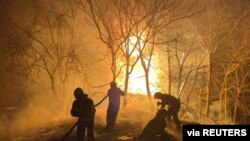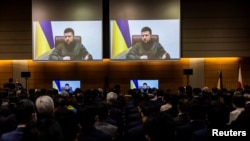Both Ukrainian and Russian leaders say some progress has been made in peace talks but striking a deal is fraught with peril, say observers. Some Western officials and independent observers are skeptical and worry Moscow isn’t negotiating in good faith and is using negotiations to restrain NATO from providing both offensive and defensive surface-to-air systems and other more sophisticated weapon systems to Ukraine or intensifying Western sanctions.
Others are skeptical that even if Kyiv and Moscow can reach some firm terms the sequencing of events necessary for a deal to be implemented will be almost impossible to pull off, much as it did with the 2015 Minsk accord that was meant to end fighting in oblasts in the Donbas seized by pro-Moscow separatists with Kremlin assistance.
There is still a chasm between Ukraine and Russia after days of video talks which have been led by Ukraine’s defense minister Oleksii Reznikov and Ukrainian presidential adviser Mykhailo Podolyak. The Russian negotiating team is headed by Kremlin adviser Vladimir Medinsky.
Ukrainian President Volodymyr Zelenskyy reiterated again this week that he is prepared to drop Ukrainian aspirations to join NATO in exchange for the withdrawal of Russian forces and a rock-solid guarantee of Ukraine’s security.
Zelenskyy has also indicated he is open to future discussions on the status of Crimea, which Russia annexed in 2014, and on the two separatist republics in the Donbas that Moscow has recognized as independent states. But Zelenskyy wants those issues discussed later after a cease-fire and a Russian withdrawal and to complicate matters he has said any proposals on Crimea and the Donbas would have to be approved by a referendum.
Ukraine’s president said Wednesday talks are moving forward. “It’s very difficult, sometimes confrontational,” he said in a video posted on social media. “But step by step we are moving forward,” he added.
United Nations Secretary-General Antonio Guterres also Wednesday struck a hopeful note. “From my outreach with various actors, elements of diplomatic progress are coming into view on several key issues,” and the gains are enough to end hostilities now, he said but refrained from divulging details.
Russia has demanded Kyiv renounce any plans to join NATO, but it also is determined to halt Ukraine’s tilt towards the West and according to Western diplomats is frustrated by the talk of Ukraine joining the European Union and wants watered down security guarantees for Ukraine that have little Western involvement.
Moscow is also demanding that it retains control of about a third of Ukrainian territory — the Kremlin-controlled breakaway republics of Donetsk and Luhansk plus all the territory around them it has captured Ukraine since it invaded on February 24. While Kyiv has now indicated it could compromise on the status of Donetsk and Luhansk, it is pushing back on Russia’s other territorial demands.
Diversion tactics?
Britain’s foreign secretary Liz Truss has been the most outspoken critic of the talks, she is concerned they are being used as a “smokescreen” by Russia to regroup ahead of a renewed offensive and even more extreme military actions. “I’m very skeptical,” Truss told The Times of London newspaper. “What we’ve seen is an attempt to create space for the Russians to regroup. Their invasion isn’t going according to plan,” she said. “I fear the negotiation is yet another attempt to create a diversion and create a smokescreen. I don’t think we’re yet at a point for negotiation,” she added.
Other skeptics point to the way Russia prolonged and used negotiations in Syria to divide Western allies and wear down and exploit splits between rebel groups fighting to oust Bashir al-Assad, Russia’s ally.
James Nixey of Britain’s Chatham House says Russia “is not — at least not yet — incentivized to make genuine offers.” He also judges “there is not enough either side can offer which the other is prepared to accept — and to do so would be far more than just political suicide for Zelenskyy and Putin, they would be a fundamental change in the nature of both countries.”
He also doubts the sincerity of Russian President Vladimir Putin. “Precedent shows de-escalation and a willingness to negotiate only convinces Putin he is on the right track, while appeasement spurs him to make further demands, '' he said in an expert comment for Chatham House.
His biggest worry is that Russia will use talks to manipulate Ukraine’s allies.
“The greater threat to Ukraine comes from the international community in many respects. And the European especially has a rather ugly recent history of successfully pressuring independent states into making concessions to Russia by ‘accepting the inevitable,’” he adds.
He points to the peace deal the Europeans led by French president Nicolas Sarkozy brokered to end Russia’s invasion of Georgia and to the 2015 Minsk accords that France and Germany pushed Ukraine into signing despite the agreements’ favorable terms for Russia.







